MEMOIRS
of
Marie Rose Bouffard Jean

Born March 19, 1915
at Issoudun, Conte Lotbiniere, PQ, Canada
I was born in the village of Issoudun , just south of St. Croix and the St.
Lawrence River on March 19, 1915 to Gaudiaus Bouffard and
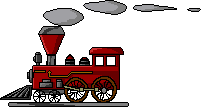 Alvine Ferland and I was
one of seventeen children. I remember my mother milking the cows and we also had
two pigs in addition to other animals on the farm where I lived until age three,
then I traveled with my family by train as we moved to Fall River,
Massachusetts.
Alvine Ferland and I was
one of seventeen children. I remember my mother milking the cows and we also had
two pigs in addition to other animals on the farm where I lived until age three,
then I traveled with my family by train as we moved to Fall River,
Massachusetts.
The year was 1918, World War One was ending and I still remember running on the
benches in the train depot and eating peppermints. There was a lot of sickness
that year and when sickness went around, they put a "contagious" sign
on the outside doors to let 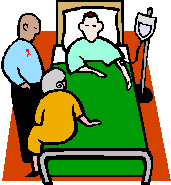 people know that there was a contagious disease so
they would not go in. When someone was sick and the doctor was needed, the
doctor would make a house call to visit and administer to the person at home. It
wouldn’t matter what time of day or night, the doctor would come when needed
for the patient who was sick or couldn’t get out of bed.
people know that there was a contagious disease so
they would not go in. When someone was sick and the doctor was needed, the
doctor would make a house call to visit and administer to the person at home. It
wouldn’t matter what time of day or night, the doctor would come when needed
for the patient who was sick or couldn’t get out of bed.
We had no telephone then and receiving a telegram usually meant bad news such as
the death of a relative or a friend. When there was a death, the body would be
displayed and the wake was held in the front parlor of the house with a purple ribbon on the door if it was an adult and a white ribbon would be displayed if
it was a child or baby.
ribbon on the door if it was an adult and a white ribbon would be displayed if
it was a child or baby.
Writing letters was another way of keeping in touch and we used an ink pen, (la
plume) and different metal tips for fine or wide writing. Black or blue ink was
used and it was sometimes messy.
I remember the wooden ice chest in the pantry on the first floor that we used to
keep foods cold. The ice block was replenished by the ice man who would deliver
ice to the house when the "ice" sign was placed in the window for him
to see.
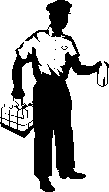 There were many peddlers and deliverymen in those days including the ‘milk man’,
‘bread delivery man’, and horse drawn wagons with fresh vegetable and fruit. A
peddler known as the ‘rag man’ would buy old clothes for rags, and you could
hear him call out "any rags?" as his horse pulled the wagon down the street.
There were also craftsmen who came around sharpening knives and scissors. My
father also had lots of skills because we had to be self-sufficient, including
repairing shoes which he did in the basement with metal shoe forms.
There were many peddlers and deliverymen in those days including the ‘milk man’,
‘bread delivery man’, and horse drawn wagons with fresh vegetable and fruit. A
peddler known as the ‘rag man’ would buy old clothes for rags, and you could
hear him call out "any rags?" as his horse pulled the wagon down the street.
There were also craftsmen who came around sharpening knives and scissors. My
father also had lots of skills because we had to be self-sufficient, including
repairing shoes which he did in the basement with metal shoe forms.
On April Fools Day we would sneak up behind my mother and tie a rag to the back
of her dress so it would look like she had a tail, it was funny and we all
laughed. On Mother’s Day and Father’s Day you would wear red or pink roses
if your parents were living and white roses if they had died. It was really sad
to see some of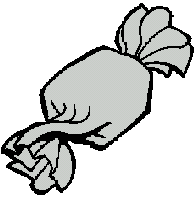 them who had lost one or both parents that I really considered
myself lucky to have a mother and father still living. The day before Ash
Wednesday, the start of Lent and fasting, it was Mardi Gras or Shrove Tuesday;
there was celebrating and mother would make taffy, ‘tire’ in French, and
everyone would have some after helping to make it.
them who had lost one or both parents that I really considered
myself lucky to have a mother and father still living. The day before Ash
Wednesday, the start of Lent and fasting, it was Mardi Gras or Shrove Tuesday;
there was celebrating and mother would make taffy, ‘tire’ in French, and
everyone would have some after helping to make it.
I was very proud of my cupie doll which is antique now. I had my picture taken
with it when I was eight years old and there was also a carriage for her. I
believe we got that with Octagon Soap coupons and we also got roller skates with
the coupons. In those days there was that kind of soap made with kerosene for
washing floors and walls.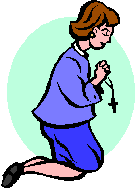
After supper we would all kneel down and say our prayers but some of the boys
were not able to stay because they had to rush off to see their girl friends.
When it started to get dark, the lamplighter would go around to light the gas
lamps on the streets, then return to extinguish them when it became light.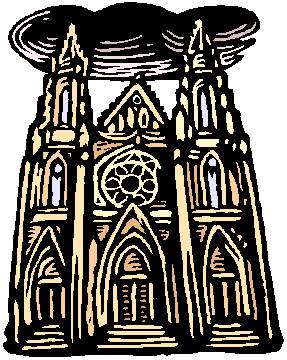
On holy days of
obligation, we had to go to church so we attended the six o’clock mass so we
could then go to work at seven. We would work eight hours with no break. Women
used to bow when walking past the church and men tipped their hats in reverence.
Things were quite different then.
Rose


[Home] [Up] [Eva Bouffard] [Diana Bouffard] [Wilfred Bouffard] [Alice Bouffard] [Ida Bouffard] [Rose Bouffard] [Germaine Bouffard] [Merina Bouffard]

![]()